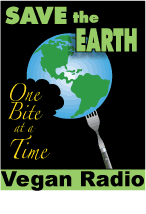What we eat has a vast environmental impact! Want to save the rainforests, clean air, protect climate, and dolphins? Go vegan! Animal agriculture is the worlds largest user of land and threatens to consume more. Stanford Univerisity's Center for Environmental Science and Policy predicts that over 6 billion acres— two-thirds more than presently used will be needed to meet the meat-habit.1 Countless independent research show that vegans live longer, healthier lives—it's probably the most powerful environmental action you can take! Better than giving up your car, going solar, or eating all organically grown produce.
 The Water We Drink There are so much to say on the negative impact of factory farming on the environment it can overwhelm. The following article courtesy PETA.org's fact sheet briefly deals with just one issues, waste water from a typical hog farm: "Much of this waste is kept in sprawling brown lagoons that occasionally spill over into surrounding waterways and cause massive fish kills. When 25 million gallons of putrid hog urine and feces spilled into a North Carolina river in 1995, between 10 and 14 million fish died as an immediate result.33 This spill was twice as large as the Exxon-Valdez oil disaster, but even smaller amounts of factory-farm runoff can wreak havoc on the environment—the pesticides, antibiotics, and powerful growth hormones that are concentrated in animal flesh are also found in their feces, and these chemicals can have catastrophic effects on the ecosystems surrounding factory farms. In West Virginia and Maryland, for example, scientists have recently discovered that male fish are growing ovaries, and they suspect that this freakish deformity is the result of factory-farm run-off from drug-laden chicken feces.34
The Water We Drink There are so much to say on the negative impact of factory farming on the environment it can overwhelm. The following article courtesy PETA.org's fact sheet briefly deals with just one issues, waste water from a typical hog farm: "Much of this waste is kept in sprawling brown lagoons that occasionally spill over into surrounding waterways and cause massive fish kills. When 25 million gallons of putrid hog urine and feces spilled into a North Carolina river in 1995, between 10 and 14 million fish died as an immediate result.33 This spill was twice as large as the Exxon-Valdez oil disaster, but even smaller amounts of factory-farm runoff can wreak havoc on the environment—the pesticides, antibiotics, and powerful growth hormones that are concentrated in animal flesh are also found in their feces, and these chemicals can have catastrophic effects on the ecosystems surrounding factory farms. In West Virginia and Maryland, for example, scientists have recently discovered that male fish are growing ovaries, and they suspect that this freakish deformity is the result of factory-farm run-off from drug-laden chicken feces.34
"The Environmental Protection Agency reports that chicken, hog, and cattle excrement have polluted 35,000 miles of rivers in 22 states and contaminated groundwater in 17 states.35 Besides the environmental problems caused by farmed animal waste, the dangerous fecal bacteria from farm sewage, including E. coli, can also cause serious illness in humans.
"Pfiesteria, a deadly microbe that has killed billions of fish, is believed to have originated from sewage run-off from pig and poultry farms in North Carolina and the Delmarva Peninsula.
"Fish farms also contribute to water pollution—farmers cram thousands of fish into tiny enclosures, and the accumulation of feces and other waste means that aquafarms are little more than open sewers. The massive amounts of feces, fish carcasses, and antibiotic-laced fish food that settle below fish farm cages have actually caused the ocean floor to rot in some areas, and the sludge of fish feces and other debris can be toxic for already-strained ocean ecosystems."36
References.
1. Vegetarian Times, "This Just In", April, 2006
33. Natural Resources Defense Council, "America's Factory Farms: How States Fail to Prevent Pollution From Livestock Waste," Natural Resources Defense Council, Dec. 1998.
34. David Fahrenthold, "Male Fish Bass in Potomac Producing Eggs," The Washington Post, 15 Oct. 2004.
35. Environmental News Network, "Environmental Issues Specific to the Agriculture Industry," ENN Online, 2004.
36. Pollution Control Authority, "Water Pollution: Fish Farms," State of the Environment Norway, 2004.
Home | Healthy Nutrition | The Environmental Crisis | Animal Suffering | Useful Links | Join Us


